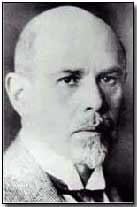Who's Who - Walter Rathenau
 Walter Rathenau (1867-1922) served as
head of the German KRA economic war management department from 1914-15.
Walter Rathenau (1867-1922) served as
head of the German KRA economic war management department from 1914-15.
Rathenau was an industrialist; his father was also head of the giant electrical group AEG. When war broke out in August 1914 (a war he believed would be lengthy) Rathenau approached Erich Falkenhayn, then Prussian War Minister, with a plan for centralised management and distribution of crucial war supplies.
Falkenhayn quickly saw the sense of Rathenau's plan - which was in itself adapted from one prepared earlier by an AEG employee (von Mollendorf) - and Rathenau soon found himself appointed head of the KRA.
Rathenau's patriotism was undeniable but it was perhaps inevitable that contracts for production of important supplies invariably ended up in the hands of the largest suppliers, including AEG, to the exclusion of smaller manufacturers.
Rathenau's tenure as head of the KRA was relatively brief however. In April 1915 he was forced to resign on account of his Jewish background, with the businesses the KRA administered demonstrating resentment at the notion of operating under what they believed amounted to Jewish direction.
Rathenau thereafter returned to his business at AEG, becoming chairman upon his father's death in June 1915. He remained active in politics however, and helped pave the way for the Third Supreme Command, the effective military/industrial dictatorship led by Hindenburg and Ludendorff.
Despite offering support for Hindenburg and Ludendorff's policies he was clear in his opposition to the adoption of a policy of unrestricted submarine warfare (without success, and which was ultimately responsible for drawing the U.S. into the war in April 1917). He similarly opposed Ludendorff's annexationist ambitions in the east.
In favour of resistance to the Allies right up until the end of the war, Rathenau joined the Democratic Party following agreement of the armistice. He served as Minister for Reconstruction from 1919-21 and as Foreign Minister in 1922.
Rathenau was murdered by right-wing extremists in Berlin in June 1922, two months after controversially signing the Treaty of Rapallo with the Soviet Union.
The financial cost of the war is said to have amounted to almost $38 billion for Germany alone; Britain spent $35 billion, France $24 billion, Russia $22 billion, USA $22 billion and Austria-Hungary $20 billion. In total the war cost the Allies around $125 billion; the Central Powers $60 billion.
- Did you know?
